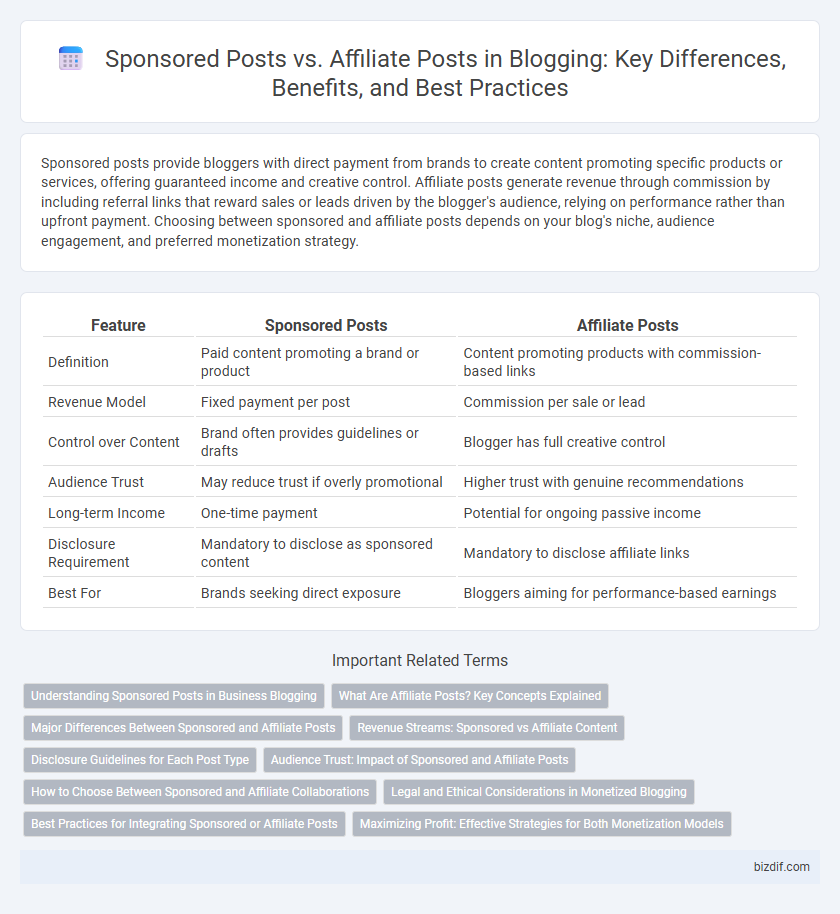Sponsored posts provide bloggers with direct payment from brands to create content promoting specific products or services, offering guaranteed income and creative control. Affiliate posts generate revenue through commission by including referral links that reward sales or leads driven by the blogger's audience, relying on performance rather than upfront payment. Choosing between sponsored and affiliate posts depends on your blog's niche, audience engagement, and preferred monetization strategy.
Table of Comparison
| Feature | Sponsored Posts | Affiliate Posts |
|---|---|---|
| Definition | Paid content promoting a brand or product | Content promoting products with commission-based links |
| Revenue Model | Fixed payment per post | Commission per sale or lead |
| Control over Content | Brand often provides guidelines or drafts | Blogger has full creative control |
| Audience Trust | May reduce trust if overly promotional | Higher trust with genuine recommendations |
| Long-term Income | One-time payment | Potential for ongoing passive income |
| Disclosure Requirement | Mandatory to disclose as sponsored content | Mandatory to disclose affiliate links |
| Best For | Brands seeking direct exposure | Bloggers aiming for performance-based earnings |
Understanding Sponsored Posts in Business Blogging
Sponsored posts in business blogging involve paid content created to promote a brand, product, or service, providing direct revenue to the blogger. These posts often feature specific messaging guided by the sponsor, ensuring brand alignment and targeted audience engagement. Understanding the transparency and disclosure requirements is crucial to maintain trust and comply with advertising regulations while maximizing the commercial benefits of sponsored collaborations.
What Are Affiliate Posts? Key Concepts Explained
Affiliate posts are blog entries that promote products or services using special tracking links, allowing bloggers to earn commissions on sales generated through those links. These posts typically include authentic reviews, comparisons, or recommendations to drive reader engagement and trust. Key concepts include performance-based marketing, click-through rates, and the importance of disclosure for transparency.
Major Differences Between Sponsored and Affiliate Posts
Sponsored posts involve direct payment from a brand for content that promotes their products or services, while affiliate posts earn commissions based on sales generated through unique affiliate links. Sponsored posts typically guarantee fixed compensation regardless of performance, whereas affiliate posts depend on tracking user actions and resulting conversions. The key difference lies in the payment model: upfront flat fees for sponsored content versus performance-based earnings in affiliate marketing.
Revenue Streams: Sponsored vs Affiliate Content
Sponsored posts generate direct revenue through fixed fees paid by brands for content placement, offering predictable income for bloggers. Affiliate posts earn commissions based on sales or leads driven by affiliate links, creating a performance-based revenue stream with variable returns. Combining both approaches diversifies income, balancing guaranteed payments with potential high-earning affiliate rewards.
Disclosure Guidelines for Each Post Type
Sponsored posts and affiliate posts both require clear disclosure to comply with FTC guidelines, ensuring transparency with the audience. Sponsored posts must explicitly state that the content is paid or sponsored by a brand, while affiliate posts need to disclose affiliate links and potential commissions earned from purchases. Proper disclosure builds trust, meets legal obligations, and maintains the credibility of the blog.
Audience Trust: Impact of Sponsored and Affiliate Posts
Sponsored posts often risk diminishing audience trust due to perceived bias, as readers may view the content as driven by advertiser interests rather than genuine recommendations. Affiliate posts can maintain higher trust levels when the blogger transparently discloses the affiliate relationship and genuinely endorses products, enhancing credibility. Maintaining transparency and authenticity in both formats is critical for preserving audience trust and fostering long-term engagement.
How to Choose Between Sponsored and Affiliate Collaborations
Choosing between sponsored posts and affiliate collaborations depends on your blog's niche, audience engagement, and income goals. Sponsored posts offer guaranteed upfront payments for promoting a brand, ideal for stable revenue, while affiliate posts generate commissions based on sales performance, best suited for performance-driven monetization. Assess your content style, transparency preferences, and long-term growth to determine which partnership aligns with your blogging strategy.
Legal and Ethical Considerations in Monetized Blogging
Sponsored posts and affiliate posts each require clear disclosure to comply with Federal Trade Commission (FTC) guidelines, ensuring transparency for readers regarding financial relationships. Bloggers must avoid deceptive practices by explicitly labeling content as paid or affiliate-driven to maintain ethical standards and trust. Failure to adhere to legal requirements can result in penalties and damage to the blogger's reputation, emphasizing the importance of transparent monetization strategies.
Best Practices for Integrating Sponsored or Affiliate Posts
Integrating sponsored and affiliate posts effectively requires clear disclosure to maintain transparency and trust with your audience, complying with FTC guidelines. Utilizing natural placement within relevant content enhances user experience and engagement, while providing genuine, value-driven reviews or recommendations boosts credibility and conversion rates. Consistently analyzing performance metrics allows for optimizing content strategies and maximizing revenue potential from both sponsored and affiliate collaborations.
Maximizing Profit: Effective Strategies for Both Monetization Models
Sponsored posts generate direct income by partnering with brands for paid content, while affiliate posts earn commissions through tracked sales links. Maximizing profit involves balancing high-paying sponsored deals with strategically placed affiliate links relevant to your audience's interests. Analyzing performance metrics and continuously optimizing content ensures sustained revenue growth across both monetization models.
Sponsored Posts vs Affiliate Posts Infographic

 bizdif.com
bizdif.com